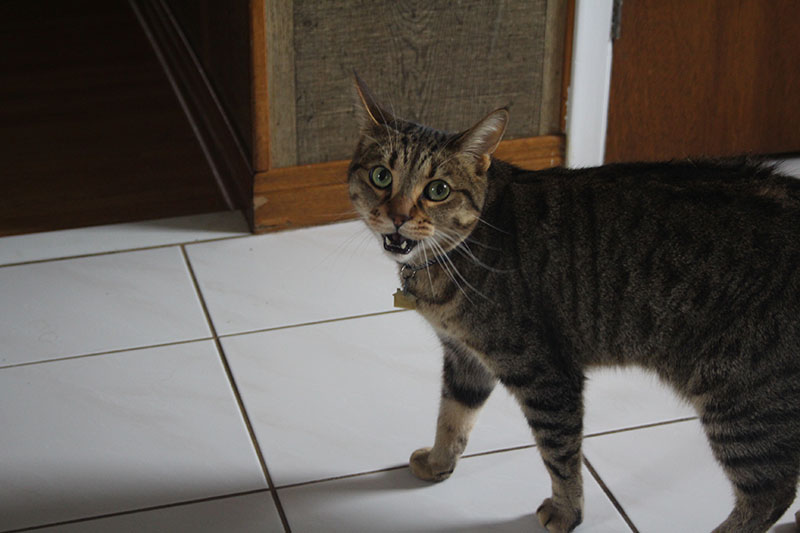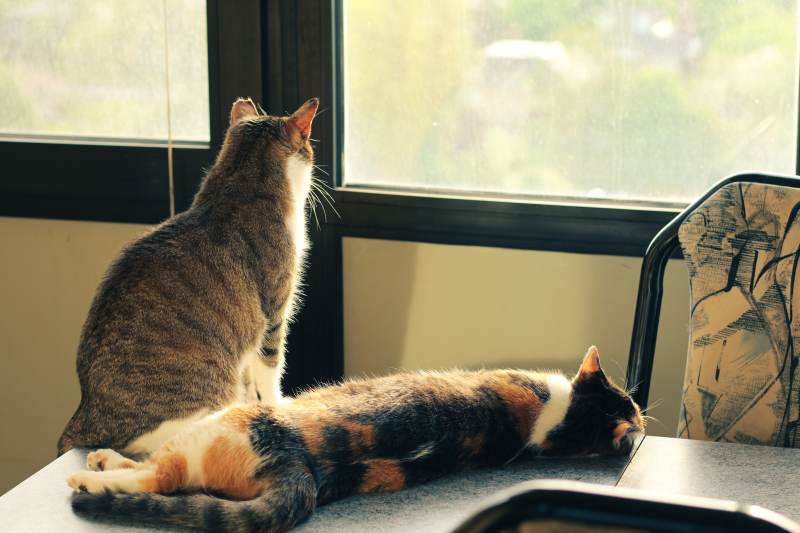Cats come in all different shapes, sizes and have so many different personalities. I can easily say that each one of the 4 cats in my current life is completely different.
First, you have Avery, my sister’s cat, who is regal, quiet and quite independent.
Then you have Walker, who is an extremely social and talkative cat.
Then you have Beau, who’s a cuddle bug, but doesn’t talk very much. He only speaks if something is wrong, if he’s hungry or if he’s in a battle with his sister.
Finally, you have Kalista, our youngest cat, who I’d say is a mixture of Walker and Beau. She’s not overly talkative, though she responds when you call. She’s also partly cuddling bug, but for the most part is independent.
So why am I bringing all of this up? Well, it’s an example of how different cats can be even in the same household.
While Walker can be an extremely chatty cat, if Beau ever talked as much as him I would be overly concerned and rushing him to the vet.
So, while it’s easy to assume that excessive meowing means something is wrong with your cat, it doesn’t always.
It will take you a bit of time to understand your cat’s personality and habits. If you monitor when it is they speak, how they speak and how long they speak, it may give you a better understanding as to what is going on.

YO, FOOD PERSON… I’M HUNGRY!
The most common reason cats meow is to let their owners know that they are hungry.
Cats will meow, even if they are open fed as a signifier that they need a top up, or merely because they are used to meowing at a certain hour.
Cats who are talkative around food tend to chat until they are given their full meal. There is no negative side to this behaviour, other than if you want some peace and quiet before dinner.
The following is a video I took of our cats Beau and Walker when they lived with each other. When one of them got hungry he used to make the other one whine as well.
I’M NOT DOING SO WELL…
Cats try very hard to hide their illnesses, however, when illnesses reach a certain point, cats tend to vocalize to let their humans know.
The most common illnesses that are tied to excessive vocalization are kidney disease, urinary tract infections/blockages, and hypothyroidism.
Though these 3 illnesses are the most common, they are not the only illnesses attached to excessive vocalization.
If your cat’s behaviour changes all of a sudden, they are over-grooming or are lethargic please take them to the vet immediately. That being said, if ever your cat is straining to urinate or defecate, please rush them to the emergency.
I WANNA MAKE A BABY!
This is predominantly for those of you who have unspayed cats.
Female cats that are in heat tend to yowl and howl to attract their mates. Unneutered tomcats will howl back at their female.
I would take a look at my piece about cats in heat if you need a quick refresher of how to reduce the symptoms.

I’M STRESSED OUT AND I NEED RELIEF
It may not be your first thought, but cats can experience stress just as much as we do (if not more.)
Cats are much smaller than we are, thus they experience everything in a very different way. Things that may not be loud to us will feel much more loud to them.
That being said, if you have a stressed-out cat they may express themselves through vocalization. Take some time to figure out what’s causing the stress in your cat’s life? Is it the amount of time you spend with them? Is it a type of smell inside your house/apartment? Is it the noise your neighbours make? Is it the smell of animals nearby?
This is a much larger process, however, there are always solutions for relieving stress. Some of the top ways to reduce stress are to create safe spaces for your cat such as cat trees, enclosed areas, music specifically for cats, calming collars or Feliway.
[Click here for a Spotify Playlist for Calming Music for Feline Anxiety & Stress]
GIMME ALL OF THE ATTENTION BABY!!
I often hear that cats are solitary creatures, and while this is semi-true it doesn’t mean that they don’t ever want attention. Many cats can’t resist being pet all over or given belly rubs.
So, if your cat is meowing while looking for you, chances are they want to be pet, played with or just want to be in the same room as you.
We experience this the most with Beau. As our apartment is fairly large, Beau isn’t always aware of where we are, especially if we are quietly working. If Beau wants our attention and doesn’t know where we are he will let out a huge yelp and as soon as we call “Yes, Beau?” he will come running to the room we’re in.
Beau actually has a different yelp for the different things he wants. An example, we call one his yowl, which he will only use while he is looking for his little sister, Kalista. These yowls tend to be lower and deeper and he will only make them when they are being separated to eat.
When Beau is done eating he’ll start searching for his sister and won’t stop crying until we open the door between them.
If they are fed in the same room, Beau never yowls, interesting, eh?
Attention seeking cats are more likely to become lonely. These cats would benefit from a playmate, extra toys (especially automatic toys), interactive feeders or something to watch (like a laptop, fish or birds next to a feeder).
Interested in getting your attention-seeking cat to be a bit quieter? Ignore your cat when they come to beg you verbally. Make sure you do not reward them until they are absolutely quiet. This will help engrain that they can get attention in other ways than meowing or yowling.
If you reward a cat while they are still meowing you may end up training them to get louder and louder to get your attention.

HELLO, HELLO, HELLO!
Similar to dogs, cats can get excited when you come home even if you’ve just been gone for 30-minutes. Beau used to be like that before we adopted his sister.
Beau used to wait patiently by the door for my partner or me to come home. As soon as we’d open the door, he’d meow at us excitedly, letting us know that he missed us.
His sister, Kalista, still does this daily. As soon as she hears the key in the door turn, she runs to the door chatting away telling either of us what went on during the day. If she’s lucky, she’ll also get the opportunity to run outside into the hallway.
HELP! HELP! HELP!
When cats are frightened they may meow excessively as a form of calling for help. This is most common when a stranger visits the home or when a cat is frightened and wants to scare off the predator.
I recently had an experience with this when I was catsitting my friend’s cat. This is what his meow sounded like:
MENTAL HEALTH PROBLEMS OR OLD AGE
The only reason I group these two is that older cats tend to experience mental health problems like dementia.
I know when I first heard about cats experiencing mental health issues, I didn’t believe what I was hearing. Actually, one of the most common mental illnesses folks think their cat has is schitzofrania, especially due to extreme vocalizations.
Older cats may become disoriented more commonly and may experience cognitive dysfunction. These cats tend to howl during the night, especially if they are confused as to where they are.
I CAN’T SEE!! I CAN’T HEAR!!
Although shocking, sometimes overly vocal cats are on the road to becoming deaf or blind. Cats who are losing vision or hearing often become more vocal in hopes of receiving extra information about their surroundings to safely navigate.
If you think your cat may be blind check out this article for some extra tips.

I’M CURIOUS, DO SPECIFIC BREEDS VOCALIZE MORE FREQUENTLY?
Oddly enough, yes. While any cat has the ability to become a frequent vocalizer, Siamese cats tend to be the most vocal.
WHAT IS USUALLY THE MOST COMMON REASON FOR EXCESSIVE VOCALIZATIONS?
It should be calming to know that out of all of the above reasons, the most common reason cats are excessively vocal tends to be because they want attention.
Oftentimes cats are conditioned to believe that their meowing gets them whatever it is they want. Well, think about it…
If your cat is meowing in the middle of the night, what do you do? You probably feed them to get them to stay quiet.
What do you do if your cat is meowing while you’re reading a book, bunting you to get your attention? You probably pet them and check to see what’s up?
It’s rewarding behaviour like this that makes cats become more and more vocal.
THERE’S NOTHING MEDICALLY WRONG WITH MY CAT, THEY’RE JUST VERY VOCAL… CAN I HELP ENCOURAGE THEM TO BE QUIET?
Make sure you only reward your cat when they are quiet if you are trying to reduce the amount of excessive meowing. If you reward a cat before they are quiet they may begin associating getting louder with the reward rather than the silence.
You can also think about feeding your cat on a schedule if your cat is showing signs that they are excessively meowing because of hunger.
CONCLUSION
While cats can be unnecessarily vocal, there are some major key problems your cat could potentially be warning you about.
If you aren’t so interested in having a talkative kitty, you may be able to train them out of being so vocal, especially if the root is because of begging or wanting attention.
Always remember that you should never scold or punish your pet verbally or physically. This will not help your cat learn faster but may cause them to become more aggressive towards you.
So pet parents, I’m curious. How many of you have a chatty cat? Let me know in the comments below!